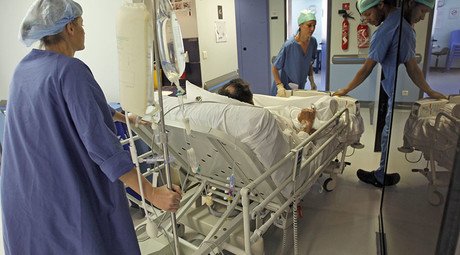Canceled operations & waiting times a ‘significant burden’ on UK patients – report

National Health Service (NHS) trusts in England canceled an average of 753 operations on the day they were supposed to be performed last year, according to a new report. It also found a significant rise in waiting times for routine surgeries.
In its annual ‘Feeling the Wait’ report, the Patients Association revealed that on-the-day cancelations by individual trusts ranged from eight to 3,269, totaling an average of 753 canceled surgeries.
Equipment shortages, lack of beds and scheduling issues were the main reasons given to patients, according to study authors.
It went on to note concern over an 80 percent rise in patients waiting longer than 18 weeks for routine surgeries. That number grew from 51,388 in 2014 to 92,739 in 2015.
The study noted the average wait time for hip replacements, knee replacements, hernia surgery, adenoid surgery and tonsillectomies was longer than 100 days.
“We have grown increasingly concerned at the waits patients are facing for surgery and the amount of patients who have had their operation cancelled on the day,” the authors wrote, adding that such stress places a “significant burden” on patients.
If the current trend continues, it seems that wait times for surgeries will only continue to get worse.
“This year’s report based on 2015 data shows that on the whole, waiting times are getting worse, not better,” the authors wrote.
“Every day we hear from the people behind these statistics on our national helpline: individuals who are in pain, worried they will lose further mobility, or will take longer to recover when they finally get their surgery. Their family members and carers are also having to share the added uncertainty and pressure faced by patients whilst they are waiting for their operations,” the authors wrote.
Meanwhile, health minister David Mowat has slammed the report, calling the claims “unreliable and misleading.”
“The latest official figures show that nine in 10 patients still wait less than 18 weeks for treatment, despite the fact that last year the NHS carried out 1.6 million more operations than in 2010,” Mowat said.
He added that “fewer than 1 percent of operations were canceled on short notice - stable despite this rising activity - and the number of people waiting more than a year has dropped by nearly 18,000 under this government."
His sentiment was echoed by an NHS England spokesman, who said the system has “significant concerns about this report which is both misleading and statistically flawed and is based on a fundamental misunderstanding of the referral-to-treatment performance standard.”
The spokesman added that “waits for an NHS operation remain close to an all-time low - down from a maximum wait of 18 months over a decade ago to 18 weeks now, with the average wait less than 10 weeks.”
“Last month more than nine out of 10 patients were waiting less than 18 weeks to start consultant-led treatment. We continue to make strides in cutting long waits, with the number of patients waiting over a year slashed from over 5,000 recorded in March 2012 to being in the hundreds now. In the last five years, since June 2011, the NHS has reduced the number of patients waiting more than a year for treatment by over 12,000.”
The Patients Association’s report was based on responses to 112 Freedom of Information requests sent to NHS trusts across England.














